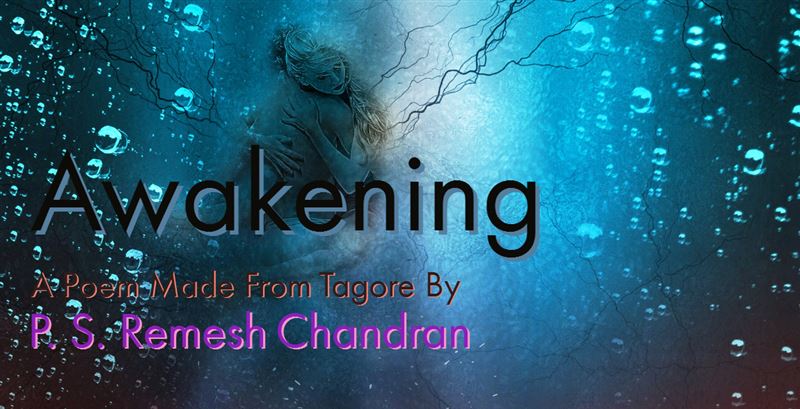
Him fountain of eternal joy from
Where life is renewed,
Ageing and life to be drained out, exit
From the world is nigh,
When suddenly comes a call from him
Above, who regulates
The flow of life through cycles of many
Births and deaths, to stop.
Suddenly sounds the drum from sky for the
Second act of play,
Life really awakens, drooping life
Joyfully responds to the call;
The wintry night desolate soon turns
Into a joyous spring day,
Undoing death, His rhythm and dance
Rejuvenates life force.
The flow of life from star to star
Follows the rhythm of his dance,
Freed from the confinement of matters
Th'Earth finds salvation;
With multitudinous fruits and grains and
Flowers of myriad hues
Her baskets of seasons are filled to the
Till and brim and all.
Thus she attains the fulfillment at the
Touch of his dancing feet,
The flow of life gushes up from death
Following incessantly
The pattern of his rhythm and dance, to the
Tune of his golden flute;
In the tornado of this violent dance,
All that is withered falls.
The triumphal arch of life is erected
Midst the joyful tunes,
And the journey of this spring meanders
Towards the fountain again.
ABOUT AWAKENING:
This poem was originally written in the rich Indian Language Bengali by Rabeendranath Tagore. Its Bengali title was ‘Udbodhan’. Rabeendranath Choudhury translated it into English in free verse and expressed the wish that somebody from some other generation may attempt the rest and make it into a poem so that all the English speaking people may enjoy India's Pride. I, Remesh Chandran. P. S. recast it in the true poetic form and made it into a song for my personal use, i.e., for my singing. After a few years I decided to release it to public so that others also may sing it. The question is, Tagore himself was a gifted poet in English. Then why didn’t he himself write it in English or himself translate it into English. The answer is, he wrote hundreds and hundreds of poems in Bengali besides writing in English which all could not be translated by him into English in his lifetime for he himself was immersed deep in musification and orchestration of hundreds which today we collectively call Rabindra Samgeeth.
Making a poem out of prose or free verse is ‘recasting it in the true poetic form’. It is one of the greatest intellectual exercises and thrills a captivated person can go through. It is not a challenge, but love and respect for the fine poet hidden inside that person who wrote it in prose. When we are captivated by the majesty of their words and the sweetness of their diction, we will ask ourselves why they didn’t write it in poetry. Perhaps they were dictated by the superb commanding power of the prose, or they did not get the time to refine and immortalize. Anyway it is a hobby of mine to make what captivates and moves me into poems. Through the years I attempted Nietzsche's 'On Truth And Lies In A Non-moral Sense’, Tagore’s Awakening, Bible’s Song Of Solomon, and the many chapters in Kahlil Gibran’s Tears And Laughter. The one rule applicable to me in this is, never add a word, not even a syllable to the original work, even if words are taken out, and only rearrange.